*** Cozy News ***I play drums like I drive – crazy!” CLASSIC ROCK APRIL 1999 – ISSUE 4
THE MAVERICKS
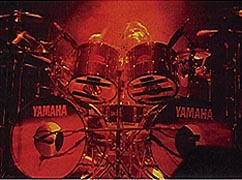
They are ‘larger-than-life’ characters in a business driven by monster egos. Legendary ‘loose cannons’; notorious non-conformists. They are, in short, the mavericks of the music industry – without whom the world would be a much less exciting place to live in. Now in an enthralling new series, Classic Rock takes a look at the lives of some of the most fascinating and over-the-top personalities in the history or rock. To kick off, we look back on the life of drummer COZY POWELL, who died 12 months ago. DAVE LING provides the overview.
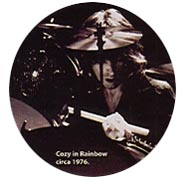
SINCE YOU’VE BEEN GONE
As Sunday April 5, 1998, drew to a close a Saab 9000 careered across the M4 near Bristol and smashed into the central reservation. It was later estimated that the car’s occupant, a 50-year-old man, had been travelling at over 90 miles per hour at the time of the collision. It was also widely rumoured that he had been using his cellular phone to talk to his girlfriend when a tyre blew up. Reportedly, the driver’s final words were: “Shit, I can’t get it out of fourth gear.” He died that same night of his injuries in hospital.
Next morning, the papers revealed that the life of Cozy Powell, a rock drumming superstar for 30 years, had ended abruptly and without warning. His famous admission that “I play the drums like I drive – crazy”, had become his epitaph.
Of course, Cozy Powell was more than your average drummer. The dexterity and power of his percussion made him a household name, and he also played key roles in the careers of many of rock’s biggest stars.
Colin Powell was born on December 29, 1947. Like most aspiring tub-thumpers, the youngster was always clobbering things around the house. He also dabbled with the guitar, but when an auntie gave him a battered old ukulele, Colin soon discovered that it made a better noise when he broke the neck off, removed the strings and hit it with a pair of knitting needles!
“I had a half-decent sense of rhythm, but I didn’t progress until I went to grammar school,” he recalled in 1995. “A couple of other musicians there had started putting a group together and didn’t have a drummer. Because of my riotous behaviour at school, I was told to play the cymbals – because I’d broken the drums! But they said, “Can you play on these three tracks?” It was pretty basic, but it started from there.”
Incredibly, ‘Cozy’ – a nickname coined by his schoolmates, after 1950’s jazz drummer Cozy Cole – never took a single drum lesson. Aged 16, he was already playing semi-professionally in local Cirencester groups when his nocturnal exploits began to affect his education. He was asked to leave and instead took up an office job for six months, during which time he raised the cash to buy his first proper drum kit, a Premier.
Just before his 17th birthday, Cozy headed to Germany for his first professional engagement with The Sorcerers. They were destined to spend three years on the German club circuit, including the legendary Beatles’ haunt, The Star Club, in Hamburg.
“We’d play for eight hours a night, which was incredibly boring,” Cozy later recalled. “I used to back strippers, so I really saw the seedy side of life, but it was a great experience. It taught me stamina and you got to try out all sorts of different things as you played, so I really learned a lot.”
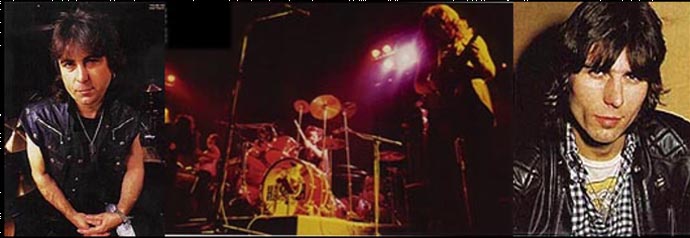
Returning home in 1968, Cozy hung out on the Birmingham club scene where he made the acquaintance of future Led Zeppelin stars – vocalist Robert Plant and drummer John Bonham, both then in Listen – and the young Tony Iommi, then playing with Earth, who would later change their name to Black Sabbath. At the suggestion of then Jethro Tull (later of Fairport Convention) bassist Dave Pegg, Cozy became heavily involved in the lucrative world of studio session work.
But his big break wasn’t far away. It came when the original Jeff Beck Group (then featuring a gravel-voiced vocalist by the name of Rod Stewart) began to flounder. Stewart and bassist Ronnie Wood had left to form the Faces and Beck was keen to unearth some new blood for his next project. So it was that in early 1971, the guitarist’s manager, Peter Grant, summoned Powell to London to audition.
“At the same time, John Bonham was being recommended for Led Zeppelin, also being managed by Peter Grant,” recalled Cozy years later. “So although we didn’t know it, we were both going for jobs in two of the biggest bands in the world, because at the time, Jeff was bigger than Led Zeppelin.”
If Cozy was awed by the possibility of working with his hero – check out the similarities between the pair’s barnets! – he didn’t let it show, and upon entering the audition room, legend has it that he told Beck: “Get rid of all the others – I’m your new drummer!” Cozy duly joined the new-look Beck Group for two albums – 71’s ‘Rough And Ready’ and the following year’s ‘Jeff Beck Group’.
“Jeff Beck was god in those days,” said Cozy 1995. “Everywhere he played was sold out and I’ve never seen that kind of adulation since. After two albums with Jeff, I left and went to the States where I was either going to join Johnny Winter or Spirit.”
Beck’s producer at the time had been Mickie Most, and Most, also the label manager of RAK Records, turned out to be a pivotal figure in the drummer’s career. However, on the fateful day that Most first encountered Cozy at Beck’s country house in Kent, he hadn’t even heard him play. “But if Jeff told me somebody was a great drummer, they were a great drummer,” he says now.
Drumming With The Devil
Cozy was soon appearing on sessions with RAK artists like Donovan, Suzi Quatro and Hot Chocolate, and rapidly assumed the unofficial status as the label’s in-house drummer.
“He could play just about anything”, explains Most. “Some may say that his drumming was just about power, but he also played on Hot Chocolate’s ‘Brother Louie’ and that was a soul record. And he was great to have around on a session because he was always so ‘up’.”
A mutual fondness for very fast motorcycles encouraged a firm friendship with the producer.
“We both loved bikes, but I could never keep up with him,” Most recalls today. “I’d always have to ask him where we were going; he’d tell me and say, ‘See you when you get there,’ and off he’d go. I’d catch up about half an hour later. That’s just the way he’d always been. But beneath the brash exterior, Cozy was quite a vulnerable, sentimental guy. He was never dismissive or flash.”
“At the time, I was doing about 15 sessions a week in London,” Cozy later recalled. “I had a fixer called Dave Katz who’d ring up and say, ‘Do you want to do a film score today, or a pop band, or a folk singer?’ It was good for a while, but then it all got a bit jaded because you got the old farts who’d been doing it for years and weren’t very good. After a while I’d had enough.”
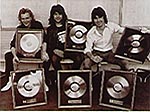
So Cozy formed his own band – Bedlam. At the same time Most had devised ‘Dance With The Devil’, a drum-based instrumental which became a shock Number Three hit in December 1973. Credited to Cozy Powell’s Hammer, a follow-up single ‘The Man in Black’, broached the Top 20 the following May, and ‘Na Na Na’ featuring the vocals of Cozy’s lifelong pal and Bedlam colleague Frank Aiello, completed a remarkable trilogy I August when it reached Number 10.
“The idea for ‘Dance…’ was all Mickie’s – he gave us a rough drum riff,’ acknowledged Cozy. “It took about 20 minutes [to record] and I didn’t think any more of it until a month later when I was asked to do Top Of The Pops, and it became this massive thing.”
Joining him in Hammer were guitarist Bernie Marsden, keyboard player Don Airey and bassist Neil Murray – three more important names in the Cozy Powell story.
“I first met Cozy when I was in Wild Turkey, and a fortnight later I got a call asking me what I was doing on Wednesday. When I said nothing I got ‘OK, be at the BBC, ten o’clock, Top Of the Pops. Ta-ra!’ And he was gone!”
It was at the Beeb’s studios that Powell proceeded to strike a blow for truth and honest.
“We were at Top Of The Pops when somebody brought it to Cozy’s attention that another of the bands had made a derogatory comment in the Melody Maker – it was either The Rubettes or Showaddywaddy – about bow he was only a session drummer who couldn’t play a note,” Marsden recalls. “Powell never said a word, just picked up the paper, found their dressing room, asked for the drummer and chinned him! But afterwards it was all sorted and he asked the bloke if he wanted a beer.”
“Cozy was always fairly wild,” Neil Murray says with a rueful smile. “He was a bit of a Jack the Lad, but in a nice way. He could never resist a practical joke, and although he had a lot of front, maybe deep down he lacked a little self-confidence. He would be driving extremely fast, and sometimes he would do things to freak you out. But he was a very safe driver. I’ve been driven slowly by other people and felt more in danger than when I was in a car with Cozy.”
Marsden vividly recalls the occasion when Cozy bought his first Ferrari. “He was like a dog with four or five dicks!” he laughs. “He rolled up in it at Keele University and it was lime green, and he couldn’t wait to take you for a ride in it and proceed to frighten the crap out of you.”
His intense fixation with speed and an undying devotion to Swindon Town FC aside, Cozy also became famous for his moments of eccentricity. Indeed, Most recalls that when ‘Dance With The Devil’ became eligible for a gold disc, Cozy insisted that it was presented to him in a biker’s caf� by Chelsea Bridge.
“We had a cup of tea and a ham roll, and then I whipped out this disc – much to the amazement of the other drivers!” Most grins.
Numerous other ridiculous tales exist, such as Cozy serving pizza to Guns N’ Roses onstage in Sacramento disguised as a delivery boy, and attempting to brick Rainbow’s keyboard player, Tony Carey into his room in a French chateau!
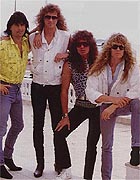
Dangerman
Nevertheless, in 1974. Following an abortive attempt to form a power trio with ex-Humble Pie guitarist Clem Champion, Powell “became disillusioned” with being a pop star. Ever restless, he abandoned music, and became a professional racing driver.
“I like anything that has an element of danger, and I’ve always found speed to be quite a turn-on,” Cozy observed in 1996. “I’ve done all sorts of speedboat riding and water-skiing and snow-skiing as well. I’d spend all day on roller-coasters – I simply adore them!”
“Jeff Beck was into hot rods, but I was interested in racing cars,” he continued. “I lived with Jeff down in Brands Hatch for a year or so, so I used to go there and dabble about. After the success of ‘Dance with The Devil’, I was invited to do some celebrity races and I did well at those. I took it very seriously and enrolled at the race school at Brand’s Hatch.”
Eventually, the choice came down to taking up a career in Formula Three or joining a new band that erstwhile Deep Purple guitarist Ritchie Blackmore was forming.
“He’d seen me with Beck at the Roundhouse. I didn’t have enough money to follow the racing through properly, and although I was only in my twenties, I was a bit old. So I joined Rainbow – basically because I’d run out of money.”
Although they would later fall out, Powell seemed to work well with Blackmore, and the fans loved his bombastic drum solos, delivered in time with Tchaikovsky’s ‘1812 Overture’ and accompanied by blinding pyrotechnics.
“Basically for 10 minutes or so, I try to take people out of their everyday reality,” Cozy once explained. “When I’m onstage, I’m an entertainer first and a drummer second.”
Cozy remained with Rainbow until a dispute over 1979’s ‘Down To Earth’ album. “I never had a problem with Ritchie,” he later claimed. “Okay, he can be difficult, but I’m difficult a well, so we bounced off each other. I’ve worked with some difficult people, but you just have to find out what they want. But towards the end of Rainbow, I felt that a couple of singles were selling out. Rainbow was formed to be a hard rock band, but although I liked tracks like ‘Since You Been Gone’ (Top 10 for Rainbow 1980), I didn’t think they were right for Rainbow. By then the band had veered off on a tangent, and Ritchie had started playing with his back to the audience – it all started to get a bit thin. A bit like a love affair, we’d grown tired of each other.”
So Cozy joined the Michael Schenker Group – a decision he would come to regret. In 1981, he still found time to appear on ex-Rainbow singer Graham Bonnet’s ‘Line Up’ album and the following hear he would help out Robert Plant with his 1982 post-Zeppelin comeback album, ‘Pictures At Eleven’.
“Planty and I got together, but I’d already agreed to do a tour with Michael Schenker and there was a lot of politics going on. So Phil Collins came in to finish the album, which I later regretted. With Michael, the touring schedule was horrendous and it started getting silly.”
The considerable offstage friction between Schenker and his drumming star didn’t help. And when Classic Rock spoke to the guitarist recently about their relationship, he remained frosty.
“I didn’t have any relationship with him, it was about music,” Schenker stated. “Cozy was a powerful drummer. Technically he wasn’t my favourite. Simon Phillips was much more fluid. Cozy was always the favourite of my brother [Rudolf, of the Scorpions]. He appeared to me like an individual, he died what he wanted. He came across as a strong personality – he needed to have a function in the band of being more than just a drummer.”
“He would always stand up for what he thought he deserved,” confirms Neil Murray. “Cozy didn’t like being treated like any old employee. If he was in a band with someone he expected to be virtually as important as the lead singer, the guitarist or whoever was running things.”
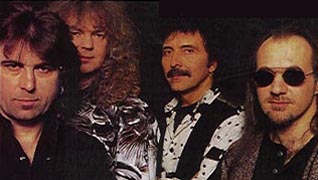
Hello Dolly
If there was even a shred of truth to the above theory, then Cozy was stepping into the lion’s den when he agreed to replace Ian Paice in Whitesnake in September 1982. An apocryphal story suggests that Cozy and mainman David Coverdale in an effort to bond, went hiking on Dartmoor.
“Cozy had mates in the SAS at the time,” Neil Murray chuckles. “But the way I heard it was that after spending a couple of nights under canvas it was too much of a shock to the system, so they found a pub instead!”
Although Coverdale didn’t know it, Cozy’s joining had been a close thing.
“David kept phoning me up, [but] at the same time, Tony [Iommi] wanted me to join black Sabbath,” remembered Cozy. “In the end I went with Coverdale and had a couple of successful years with Whitesnake. I did all the groundwork for the phenomenally successful ‘1987’ album, and David and I had done a business deal for the arrangements of the album, but when it came to the crunch, the lawyers and businessmen got involved and said, ‘The deal has been changed – take it or leave it.’ I’m a man of principle, so I walked, and of course the album went on to sell 14 million units! Aynsley [Dunbar] came in and virtually copied what I’d done!”
Cozy’s last gig with the band, at Rock in Rio in Brazil in 1985, tarnished his memories. “God, it was pathetic!” he fumed years later. “[Guitarist] John Sykes wasn’t speaking to David, or Dolly, as we called him! There were all these terrible ego trips going down.”
John Lord, who Cozy used to all ‘Brigadier’ during the pair’s Whitesnake days, remembers Cozy as being fiercely competitive, yet given to acts of unexpected generosity.
“He played on my solo album, ‘Before I forget’, on a track featuring the recorder, after which the drums came thundering in.” recollects the keyboardist, now back in Deep Purple. “Even for Cozy it was rather tricky, and did it stunningly. I think what really concerned him was that Simon Phillips was playing on another song and he wanted to be the best.
“But Cozy would always do you a favour whether he’d known you for 50 years or 50 minutes. Once, when I was moving house, he turned up on my doorstep wit [guitarist] Mel Galley and said, ‘Now listen here, Brigadier, there’s absolutely no need to call these removal chappies. We’ll do it together!’ Naturally, I paid him the going rate, which was as much Gordons gin and tonic as he could get down him!”
In 1986, after participating in the Phenomena project and helping out with the formation of Blue Murder, Cozy shocked the world by joining Emerson, Lake and, er, Powell!
“People said, ‘You only got in because your name starts with a ‘P’,” he laughed, “but the guy they had before me was called Tony Beard! Funnily enough, though the guy before him was Simon Phillips! But it was great, possibly the most enjoyable part of my career. But Greg and Keith fell out again and it all ended in litigation!”
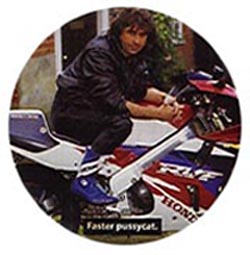
“I remember Cozy being in my barn in Sussex,” says Keith Emerson. “He set up his impressive drum rig, then realised he had no drumsticks! He considered using some fallen branches from by orchard until a local farmer drove into town to get some proper ones. They weren’t the correct weight but were sufficient when he held then upside down using the fat end. The he’d do his drum solo and it would be like World War III had broken out.”
A short spell with Gary Moore – “possibly the most difficult guitarist I have worked with” – followed, before things became unworkable. “Gary’s always said I quit, but he fired me, and he’s never told me why,” Cozy stated.
After filling in for the departed Fred Coury on Cinderella’s 1988 album, ‘Long Cold Winter’, Tony Iommi persuaded Cozy to join Black Sabbath. “I thought they’d had one personnel change too many, but ‘The Headless Cross’ was a successful album,” Cozy, not unreasonably, later reflected.
Bizarrely, he injured himself when his horse collapsed of heart attack as he exercised it in ’91, and Sabbath used the incident to oust him.
“Ronnie James Dio had come back in, and he didn’t want me, “Cozy told Record Collector. “He’d been kicked out of Rainbow and he asked me to play on his solo album to spite Ritchie, but I turned him down. He’s hated my guts ever since.”
As a result of his accident though, Cozy’s pelvis had been smashed and he was forced to spend the summer convalescing on his back at a friend’s house.
“He spent his days looking out of the window for hours on end – until a beautiful blonde came to visit the neighbours,” smiles Neil Murray. “So Cozy waved and beckoned her over to chat. To cut a long story short, he was one of the few people who could get a girlfriend even though he was hardly able to move…”
Fully recovered, Cozy accepted an invitation from EX-QUEEN GUITARIST BRIAN MAY to play in Spain at the Guitar Legends gig he was then organising, and subsequently in his band.
“It’s a cliché, but Cozy had always been a hero of mine,” May told Classic Rock. “Even when I was in Queen, I always thought it would be great to work with him. The first time I was able to do that was at the Guitar Legends gig, and calling him was a dream come true. Cozy, Neil and myself fitted together perfectly as a nucleus of a bend. After Freddie died, Queen had to be considered a non-touring entity. I’ve always been a very self-questioning person, but Cozy and his optimism were inspirational in helping me find my feet again.”
May smilingly recalls the occasion when Cozy took a rifle to the huntsmen who’d encroached onto his estate. “He took on the whole gang of them, it was, ‘Get orf moi land!’,” he laughs.
But the wildman drummer of legend also had his benevolent side, and in 1991 he turned up alongside Hale & Pace on ‘The Stonk’, a chart-topping charity single for Comic Relief. His generosity extended to re-joining Sabbath in ’94, although this second stint fame to a sudden and rather acrimonious termination at the end of a disappointing US tour.
Life In the Fast Lane
Neil Murray had been Cozy’s rhythm partner in Hammer, Whitesnake, Sabbath and the Brian May Band, so it wasn’t a complete surprise when the pair joined ex-Fleetwood Mac guitarist Peter Green when he tried to repair his career after 25 years in the wilderness with the 1997 project, Splinter Group. On paper, however, the drummer’s blood ‘n’ guts style did not sit well with Green’s more subtle blues melange.
“It wasn’t always thunderous,” the reclusive guitarist told Classic Rock. “Many people said that sort of thing, but when Cozy was with me we played many styles of music, so working together wasn’t difficult – it was a pleasure.”
And did Peter ever get a glimpse of Cozy’s beer-guzzling, bell raising lifestyle?
“No. I never saw Cozy guzzle beer. He was quite a private person. More than that, he was one of the nicest blokes I ever met.”
Nevertheless, Powell eventually left Green’s Splinter Group to play on BRIAN MAY’S ‘ANOTHER WORLD’ ALBUM AND TOUR.
“My band weren’t working on the road at the time, and Cozy had offers to work on some other projects,” Green maintains. “It was always understood that if a BRIAN MAY TOUR tour came up Cozy would do it. When my manager told me about Cozy’s death I was stunned.”
In fact, even before Cozy had left Green’s band, it looked as thought his ‘1812 Overture’ showcase had been consigned to history.
“In the last few years, Cozy had to be talked into doing a drum solo,” reveals Neil Murray. “In the 1980s, he’d tried a few other things like ‘633 Squadron’ and ‘Mars’ from ‘The Planets Suite’ but nothing seemed to work as well as ‘1812…’ In the end I think he became a bit tired of trying to validate his reputation as a showman.
Judas Priest guitarist Glenn Tipton asked Cozy to play on his 1997 solo debit, ‘Baptism Of Fire’, and later that year he hitched his wagons to Blackmore impersonator Yngwie Malmsteen for the ‘Facing The Animal’ album. Then, to show his diversity, he made a record with Colin Blunstone. Like Mickie Most, Neil Murray feels that those who remember Cozy merely as a powerhouse percussionist are doing him a grave disservice.
“The stuff he did with ELP was more complicated than just bash-bash-bash, and Cozy relished that challenge,” Murray insists. “The trouble is that once you get known for one particular thing, that’s all people want you to do.”.
“In recent years, Cozy was possibly a little bit disenchanted with the way his career was going, but it was the same for all of us who’d been in these big bands,” Murray expands. “He was possibly a little frustrated at having to play clubs and pubs; you got the impression that he was sometimes thinking, ‘Why am I not in some mega-group like Aerosmith?’ But it’s just the way these things work out. Cozy had had a pretty good life and he always said that he didn’t want to be incapacitated or hobbling around during his later years. Sometimes it’s good to go out when you’re still well thought of.”
Bernie Marsden, who once had Cozy as his best man, agrees.
“If he’d had the choice, Cozy would have preferred to go out in a fast car”, Marsden reckons. “I suspect he’d have grown old disgracefully, and he wouldn’t have wanted that. We’re fortunate that he made as many great records and that we can still hear him play whenever we want to.”
In a chilling twist, Neil Murray reveals that he was one of the last people to hear Cozy’s voice.
“I got in from a gig at Ronnie Scott’s with Peter Green and there was an answerphone message from Cozy,” he sighs. “It was too late to call him back, but next morning the message lights were flashing with the news from his girlfriend. It was one of those macabre things; he’d probably passed away when I picked up his message.”
Its known that prior to his death, Cozy had rekindled his friendship with Ritchie Blackmore and had entered discussions about reuniting Rainbow with Ronnie Dio.
The rock world can only reflect upon what might have been…
Special thanks for assistance with this tribute go to:
Jayne Andrews, Joe Geesin, Peter Green, Jon Lord, Bernie Marsden, BRIAN MAY, Mickie Most, Neil Murray, Valerie Potter, Michelle Reynolds, Michael Schenker, Joe Siegler and Phil Symes.
HOW THE STARS REMEMBER COZY POWELL
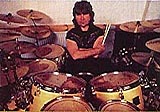
Tony Iommi “We first met nearly 30 years ago and I’ve known him all his career. We had some great times together. He was certainly hot-headed. He liked driving fast, and jokes and pranks. He’s always been a little bit prone to accidents – he swerved one time to miss a deer and he turned the car over. He had accidents, but always came out okay.”Ritchie Blackmore
“His death has been a great shock. He will always remain with us; his friendship always valued, and his music immortalised.”
Roger Daltrey
“Cozy Powell was a classic rocker. The best there was.”
Bill Ward
“Cozy was one of the greatest hard rock drummers, a direct speaking man with a love for many things, including fast cars. The last time we met, we hugged and held onto each other tightly, two old rockers, in the spirit of friends and drummers alike, each respecting the other. I thank God now that that happened on our last time together. God bless, Coze, you crazy so-and-so.”
Ronnie James Dio
“The musical world has lost a legend, and I’ve lost a friend. Cozy’s brilliance as a drummer was evident to everyone who heard him perform, but it will always be his irrepressible spirit and appetite for life that those of us fortunate enough to have known him intimately will remember.”
Roger Glover
“His challenging, lop-sided grin and easy-going charm endeared him to everyone. In Rainbow we shared many laughs and adventures – the stories are legion. He did nothing in half-measures and the title of one of his solo albums was appropriate: ‘Over The Top’.
Glen Tipton
“I shall miss Cozy’s sense of humour his warmth and his support. He had abundance of natural talent, but above all he was one of the most down to earth people I’ve ever known. I’ll never really be able to accept that he’s no longer around.”
Greg Lake
“Cozy was a close friend. He was bright, witty and very warm. In addition, he was a great musician. His loss will be felt by all those who knew him or worked with him.”
Yngwie J Malmsteen
“Cozy Powell was a friend, collaborator and mentor. His spirit will live on forever through all the fans he touched during his life, and his fantastic music that will always be with us.”
Further article:
Not-so-Cozy as suburbia
was rocked and rolled